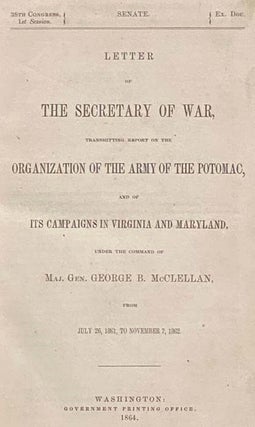Letter of the Secretary of War, Transmitting Report on the Organization of the Army of the Potomac, and of Its Campaigns in Virginia and Maryland, Under the Command of Maj. Gen. George B. McClellan, from July 26, 1861, to November 7, 1862
Washington: Government Printing Office, 1864. First Edition. Hard Cover. Very Good / No Jacket. Item #2311643
First edition. Minor loss to spine head, spine base and bottom corner of boards; two small chips to edges of front free endpaper.
242 pp. Letter of the Secretary of War, Transmitting Report on the Organization of the Army of the Potomac, and of Its Campaigns in Virginia and Maryland, Under the Command of Maj. Gen. George B. McClellan, from July 26, 1861, to November 7, 1862. "George Brinton McClellan (December 3, 1826 – October 29, 1885) was an American soldier, civil engineer, railroad executive, and politician who served as the 24th Governor of New Jersey. A graduate of West Point, McClellan served with distinction during the Mexican–American War (1846–1848), and later left the Army to work on railroads until the outbreak of the American Civil War (1861–1865). Early in the conflict, McClellan was appointed to the rank of major general and played an important role in raising a well-trained and organized army, which would become the Army of the Potomac in the Eastern Theater; he served a brief period (November 1861 to March 1862) as Commanding General of the United States Army of the Union Army. McClellan organized and led the Union army in the Peninsula Campaign in southeastern Virginia from March through July 1862. It was the first large-scale offensive in the Eastern Theater. Making an amphibious clockwise turning movement around the Confederate Army in northern Virginia, McClellan's forces turned west to move up the Virginia Peninsula, between the James River and York River, landing from Chesapeake Bay, with the Confederate capital, Richmond, as their objective. Initially, McClellan was somewhat successful against General Joseph E. Johnston, but the emergence of General Robert E. Lee to command the Army of Northern Virginia turned the subsequent Seven Days Battles into a partial Union defeat. However, historians note that Lee's victory was in many ways pyrrhic as he failed to destroy the Army of the Potomac and suffered a bloody repulse at Malvern Hill. General McClellan and President Abraham Lincoln developed a mutual distrust, and McClellan was privately derisive of his Commander-in-Chief. McClellan was removed from command in November in the aftermath of the 1862 midterm elections. A major contributing factor in this decision was McClellan's failure to pursue Lee's Army following the tactically inconclusive but strategic Union victory at the Battle of Antietam outside Sharpsburg, Maryland. McClellan never received another field command and went on to become the unsuccessful Democratic Party nominee in the 1864 presidential election against the Republican Lincoln. The effectiveness of his campaign was damaged when he repudiated his party's platform, which promised an end to the war and negotiations with the Confederacy. He served as the 24th Governor of New Jersey from 1878 to 1881; he eventually became a writer, and vigorously defended his Civil War conduct. Most historians have judged that McClellan was a poor battlefield general."--Wikipedia
Price: $150.00


